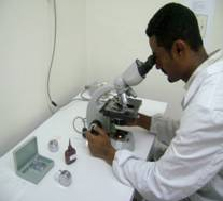To strengthen malaria laboratory diagnosis in Ethiopia, PMI procured 820,000 RDTs, 57 microscopes, 40 centrifuges, as well as other laboratory equipment for health facilities in Oromia Regional State.

A senior malaria laboratory expert examines a blood film in one of the PMI-supported health facilities in Oromia, Ethiopia. Source: ICAP
In many sub-Saharan African countries, the diagnosis and treatment of malaria relies on the clinical examination of patients suspected of having malaria. However, a substantial proportion of these patients may not have malaria. Since signs and symptoms of malaria are not specific, the only way to be sure a patient has malaria is to detect parasites through examination of a blood sample under a microscope or with a rapid diagnostic test (RDT). In Ethiopia, of the 2.5 million clinical malaria cases reported in 2007 at the health facility level, only 38 percent were tested for malaria parasites by microscopy or RDT.
To strengthen malaria laboratory diagnosis in Ethiopia, PMI procured 820,000 RDTs, 57 microscopes, 40 centrifuges, as well as other laboratory equipment for health facilities in Oromia Regional State. Providing these commodities will ensure that suspected cases will be laboratory confirmed and that the two parasite species causing malaria in Ethiopia, Plasmodium falciparum and Plasmodium vivax, are differentiated. This is important because malaria infections caused by the two parasite species require different medications. Additionally, PMI is supporting the strengthening of malaria laboratory diagnostic capacity through extensive training of laboratory personnel and the establishment of quality assurance and quality control systems.
PMI’s investment paid off one Saturday morning when Chaltu Roba came to the Bulbula health center with a complaint of a high fever. When examining her blood film underneath a microscope to confirm the suspected malaria diagnosis, the laboratory technician was surprised to see the bacterium that causes relapsing fever, a highly transmittable and deadly disease. It was the first time a case of relapsing fever was diagnosed in the six-year service of this health center. Mrs. Roba was properly treated with a dose of antibiotics.
If it were not for PMI’s support of the health center, she would have been treated with antimalarial drugs based on a “clinical” diagnosis of malaria, since the clinical symptoms of malaria and relapsing fever are similar. In the following weeks, the health center’s laboratory staff was able to diagnose eight more cases of relapsing fever and confirmed dozens of cases of malaria. The data were reported to the local health authorities to investigate and to control a potential epidemic situation of relapsing fever.
Efforts such as the one seen in Bulbula health center show that by strengthening laboratory capacity, PMI’s support will not only lead to an increase in laboratory confirmation of clinical malaria cases, but will also ensure that patients are managed according to the best available care.
